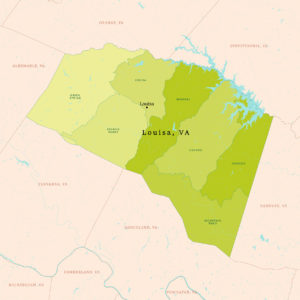
Abraham Venable II was one of 12 wealthy landowners who founded Louisa County in central Virginia in 1742. Most counties in colonial Virginia were formed by establishing a new Anglican parish, and the governance of county and parish were almost indistinguishable.
Venable served in several capacities for the new county, including:
- Vestryman and churchwarden for the parish
- Justice and militiaman for the county
- Appointed Captain of the Foot (Infantry) in the militia in 1743
In order to assume any public office in colonial Virginia, including as a Justice or militia officer, a colonist was required to take two oaths:
- An oath of loyalty to the King
- A religious test, which was surprisingly specific about an important theological tenet that differentiates Anglicanism from Catholicism: Transubstantiation (the Catholic belief that priests convert bread and wine literally into the body and blood of Christ during the Eucharist). The test was spelled out in a 1742 entry in the Fredericksville (Louisa County) Parish Book:
“I do declare that I do believe that there is not any Transubstantiation in the sacrament of the Lords Supper or In the Elements of Bread and wine at or after the Consecration thereof by any Person whatsoever.”
The Start Of Religious Freedom In America
Many English were sensitive about Catholicism because their mortal national enemies, France and Spain, were Catholic nations. However, the American colonies were anything but uniform in religious tradition:
- Maryland was founded as a Catholic colony
- Pennsylvania was founded by the Quaker William Penn
- South Carolina was dominated by “Protestant Dissenters,” such as our own ancestor Rev. Joseph Camp, an Anabaptist minister
- Vibrant Jewish communities in several port cities such as Newport, Rhode Island.
Perhaps more importantly, many immigrants to the Colonies had fled religious persecution and were wary of government involvement in theological issues.
Therefore, support for religious tests in the Colonies was relatively weak. By the time the U.S. Constitution was written in 1787, a resolution passed easily—introduced by South Carolina delegate Charles Pinckney—to include a ban on religious tests for public office as part of Article VI.
Issues Justice Venable Adjudicated
The Parish Register and the Louisa County Order Book describe the kinds of issues that Justice Venable adjudicated in the 1740s, revealing a different time and culture. For example:
- A 14-year-old orphan was bound to a carpenter as an apprentice until age 21. The adult was to, “endeavore to teach the trade of a Carpenter and provide wholsome Lodging Clothing and diet and give him two years schooling and at the expiration of above term 5 pounds in goods at money and also the following tools Vizt. one broad ax, one hand saw, one augre, one adx, once drawing knife, one Rule, one pare of compasses, two Chisels”.
- The court set the rates “that every Ordinary Keeper in this County may demand, receive or take for Drink, Diet, Lodging, Fodder, Provender, and Pasturage.” The list of “Drink” included Eastern Island Wine, Spanish or Virginia Brandy, Canary, Pennsylvania strong beer, and “Lemonade a quart with a pint of Wine therein and sweetened with double refined sugar.”
- A man was charged with “being Drunk [as he] came into Court and then and there in the presence of the Justices of the Court then sitting, profanely swore an Oath.” He was fined 10 shillings for appearing drunk and 50 pounds of tobacco for swearing in the presence of (and perhaps at) the Justices.
- A man was found “Guilty of the felonious taking of the Horse and Bridle upon him charged and that he ought to be sent to the Public Goal in WILLIAMSBURGH.” There is no comment on the length of time he was to be jailed. It was a few years before the new county was able to construct its own jail.
The Lewis Sisters
Abraham Venable was married to his first cousin, Martha Davis, a not uncommon practice at the time. Abraham’s and Martha’s respective mothers, Elizabeth and Abadiah Lewis, were sisters, and were both born on Barbados. The Lewis sisters were our only ancestors who were born south of the Tropic of Cancer, and the only two born in the Caribbean. The story of the Lewis family of Barbados is the subject of another story, The Windmills of Barbados.
© 2013 W. Mullins
